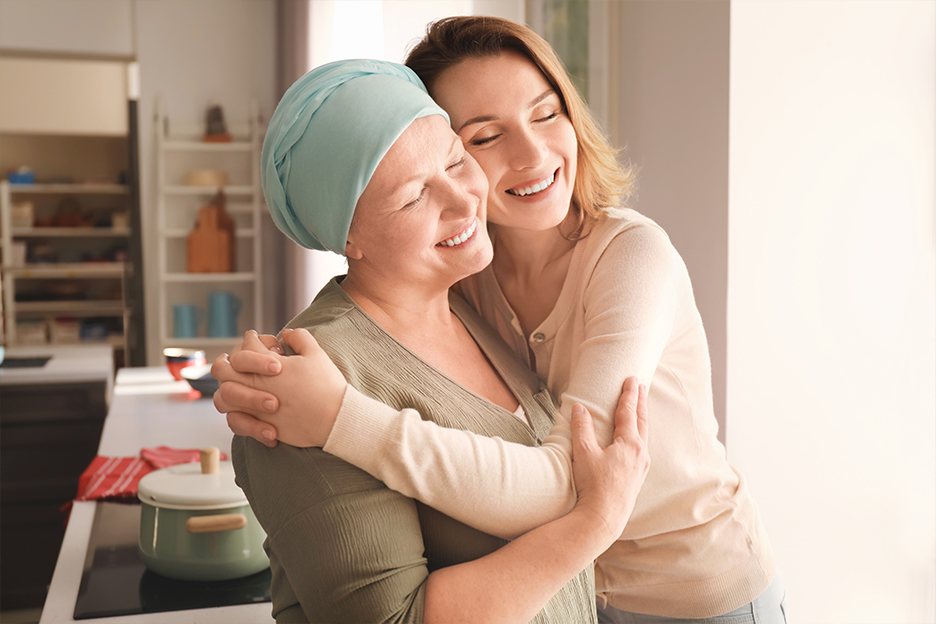Supporting a loved one with cancer can make a world of difference to them. Learn more about what you can do to support someone who’s been diagnosed with cancer without neglecting yourself.

Offer emotional support
Getting a cancer diagnosis causes a roller coaster of emotions—not just for the person with cancer, but for everyone around them as well. Family, friends, and colleagues may be overwhelmed with grief, uncertainty, and feelings of powerlessness, for example. After a cancer diagnosis, a sick person will often rely on their friends and family for support.
How to comfort someone with cancer?
Here’s how you can support them emotionally:
- Don’t cut ties with them. Keep checking in and visiting them throughout their treatments.
- Listen to them when they talk about how they’re feeling, even if they express a lot of negativity. If they don’t feel like talking, you can still be there for them. They’ll let you know when they need someone to confide in.
- Don’t judge their sadness, anxiety, or mood swings—all of which are completely normal in this situation.
What to say to someone who is sick
It can be hard to find the right words when someone you know has cancer. To let them know they’re not alone during this difficult time, show them empathy, be supportive, and above all, be a good listener.
Offer practical support
Lending practical support is a concrete way to help someone with cancer.
You could start by learning about the illness your loved one’s been struck by. If you go to one of their medical appointments with them, write down any essential information you get from the medical team to ensure nothing gets lost in the flurry of emotions.
Other than that, there are many things you can do to support a loved one who is sick on a day-to-day basis; just make sure you respect their wishes. Don’t be offended if they refuse your help.
What help to offer someone with cancer?
For example, you can offer to do the following things:
- Take them to their medical appointments.
- Help them out with their children. For example, you could drive the kids to soccer practice or help them with their homework.
- Think of enjoyable activities they can still do despite their condition. For example, you could go to the movies, have a picnic, take a painting class together, etc.
- Offer to run errands or do manual tasks for them, such as cleaning.
- Cook for them sometimes.
What not to do
Sometimes, trying to help too much can have the opposite effect. This is called "negative support". To avoid making these kinds of mistakes, pay attention to what the sick person says they need.
Here are a few examples of what not to do:
- Prevent the person from expressing negative emotions such as fear or grief. Don’t force them to “stay positive” when trying to cheer them up. Talking about our emotions can be extremely cathartic, whether they are positive or negative.
- Minimize the seriousness of their disease by saying things like, "cancer is treatable now". Make comments that are appropriate for their situation instead.
- Start sentences with "If I were you . . ." You’re not them!
- Act like there’s nothing wrong with their physical health. Don’t suggest activities that don’t respect the limits they have because of their illness.
Take some time for yourself!
Remember, you can’t take care of someone else if you don’t take care of yourself first. To maintain your mental health, make sure to do the following:
- Pay attention to your emotions. Accept and express them to ensure you don’t explode later on. Don’t hesitate to get help from a mental health professional or attend a support group.
- Keep pursuing your hobbies. Doing so will provide you with some much needed respite. As a result, you’ll have more energy to take care of your sick loved one.
- Remember that you can’t do everything. Do what you can when possible, but learn to let go when you can’t. Unfortunately, cancer can be unpredictable sometimes.
Providing comfort and support to a person with cancer is a team effort. For this reason, communication is always key.
If you have any questions about your treatment and how it may affect your health, don’t hesitate to talk to your pharmacist.
Last updated on November 20, 2024
More articles that might interest you
Resources available for people with cancer
Take charge of your health with the “breast awareness” approach
